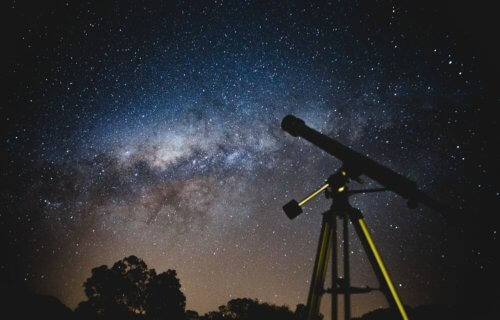If you’ve ever caught yourself stargazing at night, and wanting to get a better look at the planets above, astronomy could be the hobby for you. That means investing in a telescope to help you navigate the night sky and all its wonders. Telescopes these days are quite advanced when it comes to capabilities, so knowing which are the best for beginners is quite important, as they can be very expensive.
Of course, you’ll have to scope out an ideal solar system viewing spot. Where’s the best place on earth to see stars? Antarctica, according to researchers. If that’s too cold for you, just find any open space away from man made light sources.
No science degree is necessary to bring those constellations into better focus. However, you will want to invest in a telescope. So that got us wondering what are some of the best telescopes for beginners on the market today?
StudyFinds compiled a list of the top five most recommended telescopes for beginners across ten expert websites. Our list is comprised of the products suggested most frequently across these reviews. As always, we’d like to see your own recommendations in the comments below!
The List: Best Telescopes For Beginners, Per Astronomy Pros
1. Celestron NexStar 5SE Telescope
This telescope comes with technology to align it to what you want to see above, which is great for beginners.
“Once the telescope is aligned, use the hand controller to ask it to move to the object that you want to observe – the technology is so accurate that, more often than not, you’ll find your target at the center of the field of view,” according to Digital Camera World.
The New York Times points out it, “has a primary 5-inch mirror—big enough for a light-gathering capacity that yields crisp images of some of the best objects in our solar system, from Saturn’s rings to Jupiter’s cloud bands.”
“The NexStar SE line features a massive built-in database of stars and celestial objects, a fully motorized goto mount, and the quality optics that you have come to expect from Celestron,” adds Backyard Stargazers.
Coming in at 15 pounds, the Celestron NexStar 5SE is easily portable, and costs around $900.
2. Orion SkyQuest XT Dobsonian Telescope
The Nine Planets notes this telescope has “a large aperture of 10 inches and has 48X magnification. It is very easy to set up and has point-and-view navigation.”
“With scopes ranging from apertures of 4.5” to 12”, they are often recommended to beginners and experienced amateurs alike,” adds Telescopic Watch.
This one is bulky, but it fits in a car if you want to travel. It’ll set you back about $700.
3. Sky-Watcher Explorer 130 EQ2
“The SkyWatcher Explorer 130 boasts a Newtonian reflector design and at 5.1”/130 mm has enough aperture for studying both the moon and planets, but also deep sky targets such as star clusters, galaxies and nebulae,” according to Digital Camera World.
It also has, “an EQ2 equatorial mount with slow motion cables to give you full control and smoothly track objects as they move across the sky,” notes T3 Smarter Living.
“When aligned with the Earth’s polar axis (more straightforward than it sounds), this mount can make it much easier to track objects in the night sky for a prolonged time, it just takes a bit of getting used to,” adds Space.com.
The Sky-Watcher Explorer 130 EQ2 is heavy. At almost 30 pounds, it’s more difficult to transport. But it is less expensive than some of its counterparts, costing around $300.
4. Bresser Messier AR-80/640 AZ NANO Telescope
Screen Rant points out the Bresser Messier is, “a light and hassle-free telescope with an easy setup and no extra dials and buttons to make star gazing a chore (just point, pan, and view).”
It also features “An aluminum dew shield cuts down on unwanted light and keeps dew at bay, while the supplied red dot finder makes locating bright celestial objects easy,” according to BBC Sky at Night Magazine.
This budget-friendly telescope is under $200.
5. Sky-Watcher Skymax-127 Virtuoso GTi Telescope
This compact telescope fits nicely on a tabletop. “The whole kit comes already assembled – all you need to begin observing is to load up the power (either eight AA batteries or a one amp DC supply) and fit the supplied star diagonal and one of the two provided eyepieces, notes Astronomy Now.
“The telescope works with WiFi and can be controlled through an app for easy viewing or consumers can opt to control the telescope manually,” adds Screen Rant.
Sources:
- Digital Camera World
- The New York Times
- Backyard Stargazers
- Telescopic Watch
- The Nine Planets
- T3 Smarter Living
- Space.com
- Screen Rant
- BBC Sky at Night Magazine
- Astronomy Now
Note: This article was not paid for nor sponsored. StudyFinds is not connected to nor partnered with any of the brands mentioned and receives no compensation for its recommendations. This post may contain affiliate links. As an Amazon Associate we earn from qualifying purchases.

Nice article, BUT, no price given on last telescope. That is much needed information to have to feel equipped with information given being all I needed to research further. But still enjoyed and have some expert thoughts on where to start in choosing what I want. However, price is the most major factor for me, unfortunately. Wish it was not.
I have the Orion Space Probe 130ST, it’s a great intermediate wide field scope for viewing deep space objects at a reasonable price.